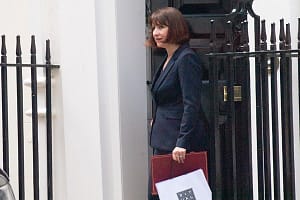Ratheesan Yoganathan is the CEO of Lebara, the sim card business aiming for 1 billion customers by 2020
Follow me: @shrutitripathi6 and @LondonLovesBiz
Next time you’re at Victoria Station and somebody nearly trips you up waving a free sim card in your face, it might well be for Lebara – whose revenue hit €648m (£504m) last year, turning a €20m (£16m) profit. And while you may ignore its salesman, the company’s four million active customers across two continents haven’t.
Lebara’s telecom business works on the Mobile Virtual Network Operator (MVNO) model: a telecom operator rents a wireless network infrastructure from another operator. In the UK, for example, Lebara has partnered with Vodafone to provide network on its pay-as-you-go sim cards.
The first bricks of the business were metaphorically laid in 2001, after Ratheesan Yoganathan and his two friends Leon Ranjith and Baskaran Kandiah went on a trip to Norway and were awestruck by mobile giant Telenor’s towers.
Yoganathan looked at the structures, realised that a telecom business had the potential to generate big money, and asked his friends: “Can we do something like that?” They sat at a nearby café, penned a business plan and picked the first two letters of their names to give the company a name (Le from Leon, Ba from Baskaran and Ra from Ratheesan).
Lebara wants to be the brand of choice for one billion people by 2020
With only dogged determination and Yoganathan’s brother’s credit card, and still all in their twenties, the trio set up the company’s headquarters in London and started selling international calling cards to migrant communities. In the early days, the friends went to other telecom companies to get bulks of calling cards on credit, and would then sell them at a premium to generate cashflow.
Ranjith and Kandiah became directors of the company and Yoganathan was made CEO, becoming the face of the company, mapping out the target audience and business model.
What’s probably got Lebara’s cash register ringing is its international calling rates of as low as 1p per minute.
All calls go through the company’s 24-hour operation centre in London, which redirects the line to international destinations with the help of its partners. Back in March, Lebara won the “Best Customer Service” award at the Mobile News Awards 2012 for the second year in a row.
Yoganathan was born in Sri Lanka then lived in India as a child, and came to London at 15 with his father – that’s what drove him to direct the business at migrants. He went on to pursue an aeronautical engineering degree at Kingston University but did not have the money to fund his masters. Looking to the bank of mum and dad was not an option, so he started working part-time at a shop selling international calling cards – this is where he got hands-on experience to understand the DNA of the calling card business.
Today, he lives in a mansion in Essex, drives a McClaren and has been named as one of the finalists for the Ernst & Young UK Entrepreneur of the Year awards taking place this September. This year’s Sunday Times Richlist valued his fortune at £120m.
He’s keen to be involved in growing other businesses too and runs a Dragons’ Den-style scheme that invests in business ideas pitched by employees. In the past, Lebara has injected a six-figure sum into Remote Goat, a social-network for designers, and has invested in the Indo-western luxury brand, The Infusion Store. Lebara claims a 50% share in both businesses.
Then there’s the hotel, Lebara has sealed a deal with India’s biggest hotel chain Taj Hotels to open a new luxury chain of hotels in Chennai this year.
So how does Lebara do it?
I’m at the Lebara headquarters in Copthall Avenue in the City of London. The walls are plastered with Gandhi’s talismans and Lebara’s uber-ambitious mission statement of “being the brand of choice for one billion people by 2020”.
“Being a low-cost provider and maintaining a high quality of service is an extremely tricky balance, but that doesn’t mean there’s scope to make money. Take India for example, we may lose money by offering calls for as low as 1p per minute but can cover costs when the customer makes national calls or uses data services. So, it’s in a collective pool that we make money,” explains Yoganathan in his passive Sri Lankan accent. He’s dressed in a sharp grey suit and comes across as a suave yet straightforward person.
Throughout our interview, Yoganathan touches wood and thanks God for the ringing success of his company. He points out more than once how London’s been instrumental to his career and that it’s the “best place to do business”.
“Contrary to what people say, I think the capital’s business scene isn’t laced with redtape. Things are simple here, you don’t need to have connections in the government to make it big here. I don’t see any better place than London to succeed in life.
“If you can’t succeed here you can’t succeed anywhere,” he declares.
That with big profits come big offers for acquisitions is no secret. And Lebara too in the past has lapped up attention from private equity firms and telecom giants alike.
“If you can’t succeed in London you can’t succeed anywhere”
Last year, Yoganathan and his mates appointed Royal Bank of Scotland to conduct a sale with an expectation of fetching £650m. Telecom bigwigs including T-mobile and Dutch operator KPN were believed to be interested in getting their hands on the company with Vodafone touted as the frontrunner – but the sale never happened as Vodafone declined to bid.
“2011 marked the tenth year of Lebara and we thought it’s time to do a little SWOT analysis of the business. We were getting enquiries from VCs in abundance, so we thought we’ll evaluate how much buyers are ready to pay for the business,” Yoganathan tells me.
The lack of interest to buy Lebara didn’t faze Youganathan and he doesn’t like crying over spilt milk. “I am very happy the way Lebara is shaping up,” he says assertively.
“So will you consider cashing out in the future?” I ask.
He pauses for a second and says, “No, we won’t.”
“I think there is room for much more than the €648m we generated as revenue last year. I want to see the company achieving its goal of being the choice of brand of one billion customers by 2020, I don’t want to call it quits before that.”
Quiz him about who his arch rivals in the space are and he gives a clichéd answer, “I don’t really see any one company as competitor, I think the market is big enough for all of us to take a bite out of it. I think we ourselves are our biggest competitors.”
That frankly is quite unbelievable. In any given newsagent, sitting next to Lebara’s products are equally competitively-priced sim cards like Vectone mobile, Lyca mobile amongst others. Doesn’t Yoganathan ever fear losing out to them?
“Look, in price these brands are competition. In brand, they are not,” he says.
He then tells me how he wants to build a brand that migrant communities across the globe identify. Much like, money transferring service Western Union.
“From an 18-year-old migrant who comes to London for the first time to my 93-year-old grandfather, Western Union is a brand that everyone knows, it’s like the Mars bars. And that’s what I want to do with Lebara.
“I don’t want to restrict it to a company that provides sim cards. I want to build a global brand which offers banking, insurance, internet and every other service that migrant communities would use. So going by the bigger picture, I don’t see other telecoms as competi
tion.”
To me, it doesn’t look as easy as it sounds but the man’s hell-bent, “Lebara is a brand and not a product and that’s what our competitive edge is.”
Apart from hard-core business enterprises, Yoganathan spends his time growing the Lebara Foundation, a charitable venture which feeds over 16,000 kids in India every day. He started the venture after Tsunami struck India and Sri Lanka in 2004.
He obviously does his bit for his community, but does he see himself flying the flag for Asian entrepreneurs in the UK?
“I don’t think I fit in the Asian entrepreneur clique very well simply because I don’t see myself as an Asian – or even a Briton for that matter. When there is a football match I support England, I root for India during an India versus Sri Lanka cricket match, and when people ask me where I am from I say Sri Lanka – even though I don’t remember the last time I’ve been there!”
He may not identify with his fellow Asian highfliers or acknowledge his competitors, but Yoganathan’s definitely in the fast lane to reach his “one billion customers” destination.
More like this:
Pat Nabhan: From jobless in Sri Lanka to £100m turnover telecoms king
Can Wonga become Facebook for finance? Interview with Errol Damelin
Addison Lee founder John Griffin on building his £200m minicab empire
Try our free newsletter and follow us @LondonLovesBiz






Leave a Comment